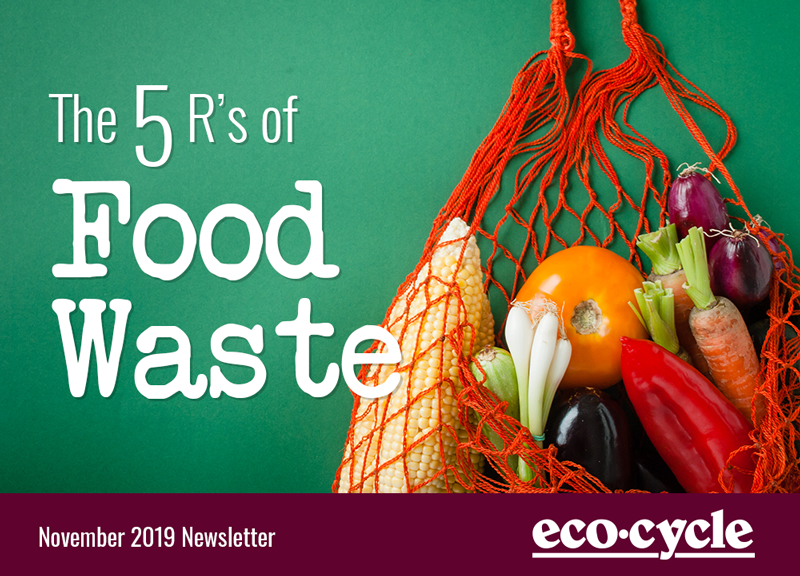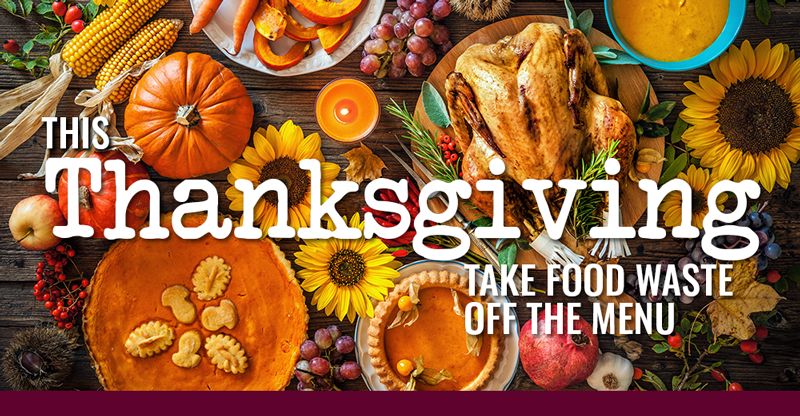 | The Five R’s of Reducing Food Waste: Rethink, Refuse, Reduce, Reuse, Recycle No one likes to waste food, but despite our best intentions, most of us have pulled out spoiled leftovers from the back of the refrigerator, or thrown out fruits and veggies that were past their prime. Globally, 31% of all food is wasted, and in the U.S. 40% of food is thrown out – amounting to 400 lbs. of food wasted per person per year. Wasted food also generates climate change pollution equivalent to 37 million cars per year.If we redirected just one-third of the food that we now waste to people in need, it would more than cover unmet food needs across the country. If minimizing food waste is important to you, here’s how you can get started! | |  | To really reduce food waste, we have to start by questioning our beliefs and actions that can unintentionally lead to wasted food. For example: Over-shopping: Do you do all of your food shopping on one day of the week hoping to avoid a second trip to the grocery store? Try limiting what you buy to the necessities - a second trip to the store later in the week could be just a quick stop! Making too much food: Many recipes yield far bigger meals than your household can consume. Try halving the recipe, or follow recipes designed for smaller yields, like those provided by Dessert for Two. Rethinking what’s edible: Do you cook broccoli florets, but throw out the stalks? Or roast beets but never eat their greens? Stems and leaves of vegetables are actually loaded with nutrients - find ways to use up those veggie scraps! | |  | Be aware of situations where taking more food than you will eat is common! For example: Buying in bulk: Shopping at warehouse clubs or buying a lot of an item just because it’s on sale can save money – but it can also lead to a lot of waste. Be sure you can use up large purchases. All-You-Can-Eat Buffets: With all the choices in front of you, it can be easy to load up on more food than you can eat. Take small portions – and go back for seconds of the dishes you enjoyed the most. Wishful eating: Do you buy apples because you know they’re good for you, but never end up eating them? Is tempeh on your grocery list, even though it never sounds tempting? Refuse the foods that most commonly go to waste. | |  | Streamline your food use by planning meals, shopping smart, and storing food properly – you’ll not only reduce food waste, but wasted money, too! Plan your meals: Plan how you can use the same ingredients in multiple meals. For example, use up kale by adding it to salads, soups, smoothies, and sautéing it with garlic as a side dish. Make a list (and shop your kitchen first): Make a list of all the food you need and the quantity needed. Before heading to the grocery store, check out your refrigerator and pantry – you may already have many of the items on your list! Store your food: Take the time to wash, dry, and chop produce, storing them in clear containers and labeling them so you don’t forget they're there. | |  | Even when produce has lost some of its freshness, it’s still edible! You can easily extend the lifespan of food nearing its expiration date. Less-than fresh veggies and fruit: Add overripe fruits and veggies to smoothies, or bake fruit into cobblers and veggies into casseroles.Or, freeze fruits and veggies to preserve them for weeks (or months)! Leftovers night: Much of the food Americans waste are leftovers that are forgotten. Reverse this habit by reserving one day a week to eat up leftovers. Donate: Find a food bank in your community – you can often donate fresh produce that you know you won’t be able to eat, in addition to canned and packaged foods that are nearing their “Use by” date. | | | | Inevitably, you will have some residual food waste – but don’t throw it in the trash! Organic matter (like food) that is thrown in the trash rots in landfills and produces methane, a dangerous greenhouse gas that is 80 times stronger in trapping heat in the atmosphere than carbon dioxide. Prep before you compost: Before you throw food in the compost, take off stickers, rubber bands, tags, and any other non-organic materials. Throwing plastic into the compost bin can lead to finished compost containing microplastics, which can get into soils and groundwater. Use compost in your garden: You’ll not only grow more nutrient-rich food that requires less watering, you’ll also increase soils’ ability to absorb excess carbon from the atmosphere to help curb climate change. | |  | This month, when you are preparing for your Thanksgiving festivities, reducing your food waste should start before you even go to the grocery store. We have a few tips to help you reduce your waste during the holidays. Hosting your family and friends for Thanksgiving? Try using a food calculator— like NRDC’s Save The Food Guest-imator—to help you figure out how much food you will actually need to make in order to feed your guests, and reduce your food waste! Now it’s time to start building your grocery list. When you’re looking for recipes, try to find recipes that will “fit” together. For example, if you have a stuffing recipe that calls for one and a half onions, find a gravy recipe that can use up the remaining half of an onion. It’s also helpful to tally up exactly how much of each ingredient you will need to complete your recipes, so you don’t overbuy ingredients. If you have only one recipe that calls for two tomatoes, write “two tomatoes” on your list, and buy two individual tomatoes instead of a bunch of them! Do you have leftover fresh ingredients after you prepare your meal? No worries! Become a pro on how to correctly store your food so it will last longer. Check out this food storage guide that gives you the information you need to keep your food fresh for longer, helping to reduce your food waste! When your Thanksgiving meal is over, have to-go containers at the ready to fill with leftovers for your guests to take home. Don’t want to dole out your personal reusable containers? When you invite your guests, let them know ahead of time to bring their own containers if they want to get leftovers! | | | | | | | | | | Eco-Cycle
PO Box 19006 | Boulder, Colorado 80308
(303) 444-6634 | recycle@ecocycle.org | | | | | | | |